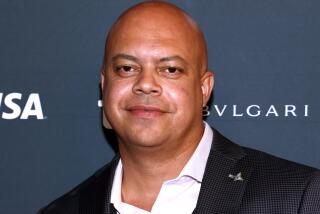Reputed Mob Boss Acquitted in Moscow
- Share via
MOSCOW — A reputed Russian mob boss known as “Yaponchik,” or “the little Japanese,” who was deported to Russia after serving nearly 10 years in a U.S. prison for extortion, was found not guilty on murder charges Monday and walked free from a Moscow courthouse.
The case against Vyacheslav Ivankov, 65, had drawn great interest in Russia since he was flown back to the country last year under guard and immediately jailed to face charges that he killed two Turkish citizens during an argument in a Moscow restaurant cloakroom in 1992.
Ivankov -- whose nickname may derive from his vaguely Asian appearance and short stature, or his expertise in the Japanese martial art of jujitsu -- has become a celebrated figure among the country’s chanson singers, whose genre could be described as a cross between gangsta rap and Frank Sinatra.
In one ode to Ivankov, crooner Villi Tokarev offered the alleged mob godfather some moral support. “Slava, hang on a little longer,” he sang, using another nickname for Ivankov. “We’ve been given 120 years to live. It’s too bad I can’t buy you a ticket to hit the road of freedom.”
On Monday, Tokarev’s wish came true when a jury acquitted Ivankov.
The court proceedings were held behind closed doors for security reasons, Russian news agency Itar-Tass reported, and Ivankov left the building without speaking to reporters. But one of his lawyers, Yuri Rakitin, said the prosecution’s case had simply collapsed.
“The prosecutors’ witnesses came and all said the same thing: ‘This is the first time we’re seeing him. He was not present on the night in question,’ ” he said.
Another defense lawyer, Sergei Kotelevsky, told Itar-Tass that the murder allegation was primarily based on the word of a witness who in 2000 was shown a photograph of Ivankov and identified him as the gunman. But when the witness saw Ivankov in the courtroom, he said he was not the killer, Kotelevsky said.
Others, however, including the daily newspaper Gazeta, had predicted that it would be difficult for prosecutors to win their case because witnesses might be afraid to testify against Ivankov, whom many regard as a terrifying figure.
In the Russian legal system, an acquittal is not necessarily final, and prosecutors said they would appeal.
Earlier in the trial, various musicians had appeared at the courthouse to show their support for Ivankov. Among them was Tokarev, who at one point told Russia’s Interfax news agency that Ivankov was a “great man and a real patriot.”
In an interview Monday, Tokarev said he had became familiar with Ivankov more than a decade ago, while performing in a Brooklyn nightclub. Ivankov, who reportedly operated in Brooklyn’s Little Odessa area, was sometimes a guest.
“He and I aren’t well acquainted, but I know this man based on the opinions of a great number of people, good people, who live in America, Canada, Australia, Israel, Russia,” Tokarev said. “He deserves respect for his principles, decency and honesty. And I am very happy that the Russian justice system acted humanely and made the decision that it did.”
Tokarev acknowledged that Ivankov is often called a vor v zakone, which roughly translates as “a thief who lives by a code.” But many such people, he said, “are far more decent than any intellectual who tolerates a lot of dirtiness toward his fellow man.”
Court papers filed at the time of Ivankov’s 1995 arrest in New York alleged that he had founded a major criminal organization in 1980 in Russia, where he and associates used fraudulent police documents to search the homes of wealthy people and steal money and other valuables. After being convicted in 1981 of crimes relating to these thefts, Ivankov was sentenced to 14 years in prison.
He was freed in 1991 when the Supreme Court cut short his sentence after a campaign by another singer, Iosif Kobzon, and a politician, Vyacheslav Fyodorov.
Ivankov illegally entered the United States in 1992, U.S. authorities said after his New York arrest. In 1996, he and three other Russians were convicted of conspiracy and attempting to extort $3.5 million from a Russian emigre investment firm.
*
Natasha Yefimova of The Times’ Moscow Bureau contributed to this report.
More to Read
Sign up for Essential California
The most important California stories and recommendations in your inbox every morning.
You may occasionally receive promotional content from the Los Angeles Times.










